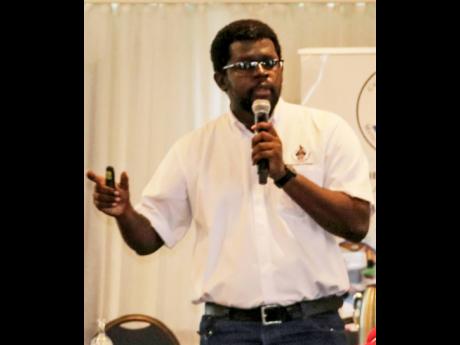Beware ... the heat is on!
UWI lecturer wants Caribbean gov’ts to start monitoring info in weather advisories
AS JAMAICA and the rest of the Caribbean brace for the annual Atlantic hurricane season which runs from June 1 to Novermber 30, a scientist based at The University of the West Indies, Mona, is calling for a regional rethink on preparing for the devastating impacts of climate on health, agriculture and the availability of potable water, among other things.
Addressing Wednesday’s opening session of the Wet/Hurricane Season Caribbean Climate Outlook at The Jamaica Pegasus hotel, in New Kingston, Dr Jayaka Campbell, lecturer/undergraduate co-ordinator in the Department of Physics in the Faculty of Science and Technology, called for policies to address the inequities.
“When we think about the impact of climate, we need to think about those who have the resources and those who do not. Think about the homeless, the needy, the young and the infirmed. We now need to start looking at whether it is more likely in the summer months for the elderly to die of heat stress, stroke or other heat-related illnesses. Should we be developing a tiered warning system with clearly delineated things that must be done, and things that can’t happen, so that, if for example, the alert goes to red, then we can’t have outdoor activities?”
Dr Campbell told The Gleaner that his intention is not to scare anyone, but rather to raise awareness of the serious risks faced by people going about their normal everyday activities, as a direct result of the sustained heat.
“In the region, we tend to think that we just hot. And if you look back through our records, how many heat waves have been noted? How many temperature extremes would have been noted? We largely lead ourselves to thinking that we just hot, but the heat presents, and usually by the time you start feeling the heat exhaustion, it’s already too late,” he warned.
Dr Campbell says Caribbean people need to be awaken to the reality that across the entire region, extreme and devastating climate changes are heralding a new climate region and things are not the same anymore, as some countries, such as Grenada, have experienced a 400-per-cent increase in consecutive dry days. “In fact, in some places, night-time temperatures are exceeding the rate of the day-time temperature warming, which has led to the realisation that the diurnal temperature variation, the variation between a high air temperature and a low temperature that occurs during the same day, is shrinking.”
Dr Campbell is convinced that given the way the daily activities of Caribbean people are centred around weather, it is time for policy-makers to start monitoring and take seriously the information contained in the weather advisories issued by national and regional agencies and incorporate them into their long-term planning.
“We need to get to that point where the advisories mean something. Whatever affects crops and livestock, affects food security and nutrition, therefore affecting every aspect of the economy. So it’s hard for me to think about the water sector as separate from health, or agriculture as separate sectors. I have to think about them in a connected sense because water is life. Without health we can’t do anything and without energy we are stuck. We plant around climate, we plan carnival around climate, our schools holidays and our vacations are impacted, so most of what we can do is tied to climate.”
Given the cross-cutting implications and far-reaching multiplier effects of climate, entire population could be at serious risk and so there has be a collective effort, given also the serious mental ramifications.
According to Dr Campbell, too often policy-makers and relief agencies, in providing assistance to people affected by extreme weather conditions or other disasters, are blind to the emotional and mental suffering of those for whom they are providing the much-needed assistance.
“If somebody’s house gets devastated by a storm, there has to be some immediate intervention to help them financially and with clothing, food and the like, to address their immediate needs. However, very often they are also suffering mentally, but can’t articulate that, and this cannot be seen as (is) a burnt arm or a broken leg would be easily visible. Because the next time they hear the word hurricane or the season comes around, they might encounter an anxiety attack and people looking on, even close relatives, can’t understand why this is happening.
“There is telling information within the region about how to move forward, but the challenge is to communicate it to the people who need most to know, without scaring them. We need to start the long-term planning now,” he said.

